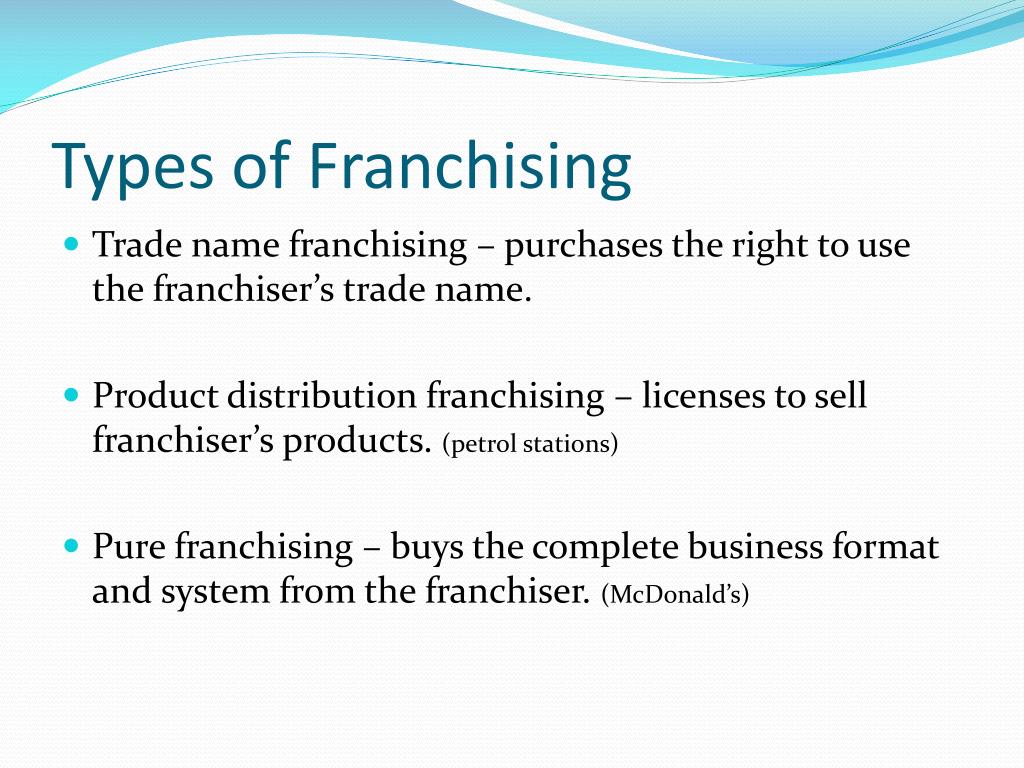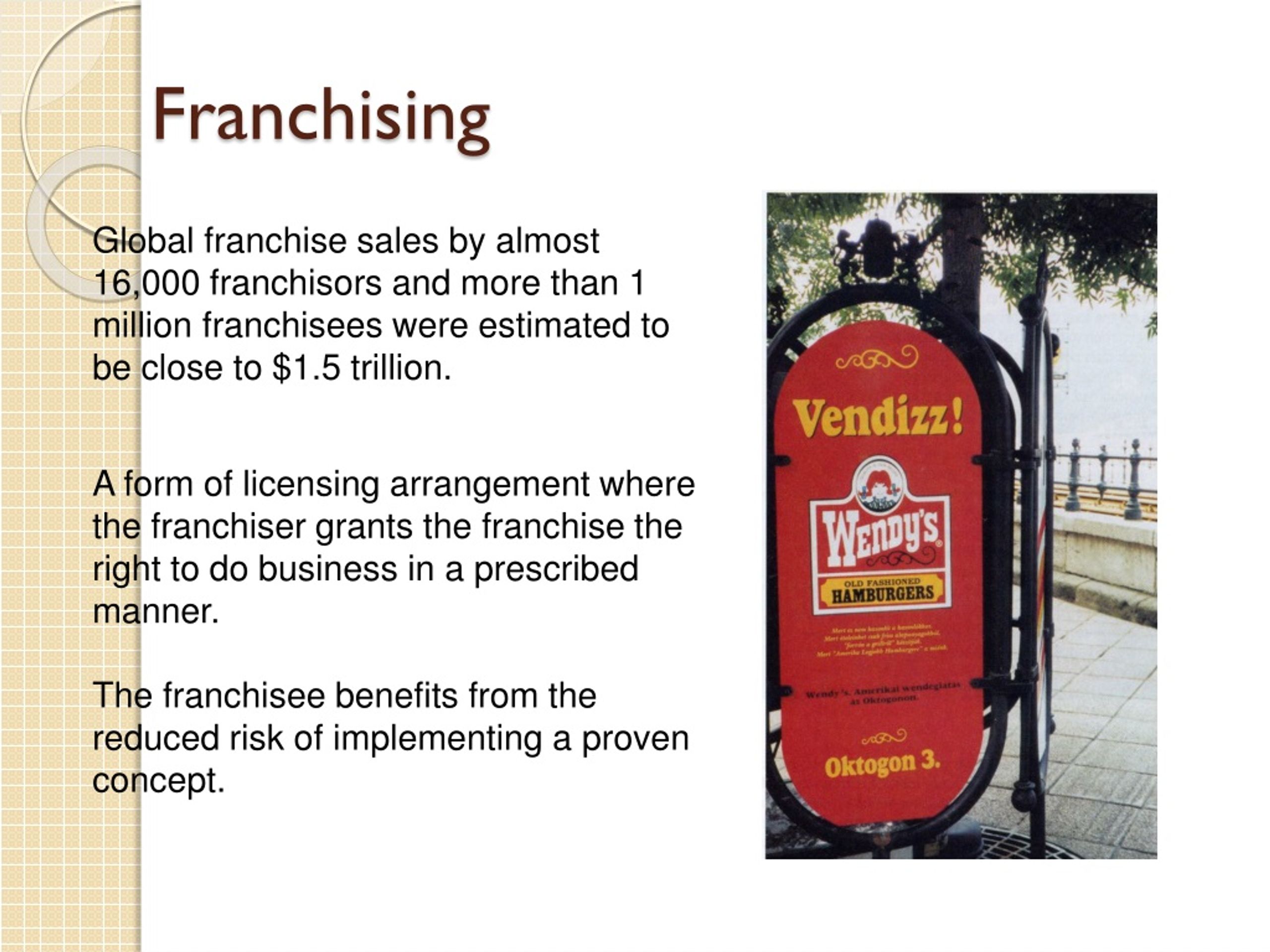
A brief description about each of these follows:
- 1. Trade-name Franchising: When franchisee purchases the right to use the franchisor’s trade name without actually distributing the specific trade mark products exclusively using the name of the franchisor, this is called ‘trade-name franchising.’
- 2. Product Distribution Franchising: ...
- 3. Pure Franchising:
What is a trade name franchise?
What is Trade Name Franchise? Trade Name Franchisee can be defined as an arrangement in which there is a supplier (franchisor) who supplies a product or product family to any dealer (franchisee) who could also avail the identity (brand name) of the supplier (franchisor). Trade Name Franchise is also known as product franchise.
What do you mean by franchising?
The term franchising can also be defined as a method of distribution of services or products. In trade name franchising, the franchisor does not control the business processes, training and other methods at Retailer's (franchisee's) end.
What are the different types of franchising?
Standard forms of franchising include product franchising, traditional franchising, and business format franchising. Product distribution franchising, more properly called traditional franchising, does not as often come to mind when most people think of a franchise but is quite a bit bigger in volume than business format franchising.
What is a business format franchisee?
The business format franchisee’s position is in complete contrast. He will sell only the range of products associated with the franchisor’s business, using the franchisor’s name, business systems and methods. The business format franchisee will pay fees and will obtain ongoing support from the franchisor.

What are the 3 types of franchising?
There are three main types of franchise opportunities available, these are: Business format franchises. Product franchises, or Single operator franchises. Manufacturing franchises.
What are the 4 types of franchising?
The four types of franchise business you can invest inJob or operator franchise. These owner operator franchises are usually home based, which keeps overheads down to a minimum. ... Management franchise. ... Retail and fast food franchises. ... Investment franchise.
What is a franchisee name?
The fictitious name, also known as the d/b/a, doing business as, trade name or assumed name. Every franchisee uses one and, in almost all cases, it's the franchisor's trademark. And while it may be considered “fictitious,” the value of the name is very real to the franchisor.
What are examples of product franchising?
A few well-known examples of product franchises include General Motors, Ford Motor Company, Exxon, Coca-Cola, and beer distribution companies.
What are the 2 types of franchises?
There are basically two types of franchises. There's Product Distribution Franchising (or what's really called traditional franchising), and there's Business Format Franchising, which most people recognize as franchising.
What type of franchise is mcdonalds?
McDonald's operates a heavy-franchised business model, where most stores are franchisees.
How do I find out a franchise name?
Getting the Name of a Specific Franchise Owner You can visit the business in person or call, and in most cases, you can get a name immediately. If the manager is unwilling to tell you the name of the owner, you can try contacting the franchising company's head office.
Can a franchise have a different name?
The way a business is registered clarifies protections for both the franchisee and the franchisor. Therefore, to answer the question, a franchisor should absolutely allow, even prefer, a franchisee to comply with their state's laws and file a fictitious name registration when required by that state.
Who is called franchisor?
It is the original or existing business that sells the right to use its name and idea. The small business owner who purchases these rights is called a franchisee and the branch business, itself, is called a franchise.
What type of franchise is KFC?
Franchise Details KFC (Pty) Ltd, a subsidiary of Yum! Brands, Inc. is a global quick service restaurant brand with a rich history of global success and innovation serving great tasting chicken across a number of global territories.
What type of franchise is Starbucks?
Starbucks doesn't technically offer franchises, as all of the brand's worldwide stores are company-owned. But if you're interested in a Starbucks franchise, you're not completely out of luck. The company does license some of its stores, which from an operational standpoint is quite similar to being a franchise owner.
What are the five 5 major types of franchises?
The five major types of franchises are: job franchise, product franchise, business format franchise, investment franchise and conversion franchise.
What are the 4 types of franchising and give an explanation about it?
Learn the 4 main types of franchise arrangements: single unit, multi unit, area developer and master franchise. The franchising industry is very versatile, with multiple franchises, industry options and investment ranges. In addition, there is a diversity of types of franchise arrangements available.
What are the 5 types of franchising?
The five major types of franchises are: job franchise, product franchise, business format franchise, investment franchise and conversion franchise.
What are 5 characteristics of a franchise?
8 Characteristics of Highly Profitable Franchises1) An excellent location. ... 2) A dedicated, involved franchisor. ... 3) A proven track record. ... 4) Little or no competition. ... 5) Recession-resistant. ... 6) Free of legal entanglements. ... 7) Not afraid of effective change. ... 8) Priced right.
What are five examples of franchises?
Some notable examples of franchises include:McDonald's.Starbucks.Dominos.KFC.Pizza Hut.Subway.Dunkin' Donuts.Taco Bell.More items...
What is a trade name?
A trade name is an official name under by the company to promote its brand, services or product and is different from the registered company’s name. An owner of the company has numerous choices for a trade name.
How is Trade Name Different Than a Trademark?
A trade name and trademark may sound similar but have different meaning and uses which must be known by a person carrying out a business or for the individual willing to start a business.
Why is it important to have a trading name?
Provides Privacy: It provides privacy for the owner especially for the sole proprietor as they may have to use the name for the company but having a trading name helps them in keeping privacy and doing business with an official name. Flexibility: It provides flexibility in the business as there can be many trade names for a business which helps in ...
How often do you need to renew your trademark?
Some states also require these trademarks to be registered in every few years to maintain their name, which involves extra cost and efforts.
What is franchising in business?
Franchising is a form of marketing and distribution in which the owner of a business system (the franchisor) grants to an individual or group of individuals (the franchisee) the right to run a business selling a product or providing a service using the franchisor's business system.
What is franchise part of?
Individual franchises are part of a brand’s ecosystem, a network that is a pooling of resources and capabilities.
What are the different types of franchises?
There are three main types of franchises. • Most franchises fall under the business format type where the franchisor licenses a business format, operating system, and trademark rights to its franchisees. • The second type of franchise is product distribution, which is more of a supplier-dealer setup.
How long do franchise fees stay collected?
In addition, fees are collected regularly for as long as the franchisee owns the franchise. In exchange for these payments, the franchisee will receive continued support such as marketing assistance and ongoing training opportunities.
How did Singer Manufacturing Company help?
The royalties earned from the license rights helped offset manufacturing costs and, because each franchise was self-financed, Singer Manufacturing Company was able to tap into the entrepreneurial attributes and local market knowledge of the franchisees to help Singer become more successful than he could have by himself.
How did franchises help the United States?
Car manufacturers who had been spending enormous amounts of capital tooling their assembly lines found they could develop retail distribution networks using capital provided by independent dealers. Oil companies such as Standard Oil and Texaco also started granting franchises to convenience stores and repair mechanics across the U.S. to efficiently expand their reach.
When purchasing a franchise, is the franchisee required to comply with strict guidelines and rules regarding the operation of the business?
When the purchase of a franchise is made, the franchisee is required to comply with strict guidelines and rules regarding the operation of the business. These guidelines are in place to maintain brand consistency.
What is a franchisee in a product/trade name?
Answered by Shelley Nadler. In a product/trade name franchise the franchisee will be a distributor of the product. In a traditional distribution agreement, the distributor’s business is just that.
What are the advantages and disadvantages of buying a franchise resale?
Alan Wilkinson writes: Franchise resales may come about for a number of reasons. Often a franchisee will... read more
Can a supplier sell only one product?
It is unlikely that he will sell only one supplier’s products. He will sell whatever he distributes under his own name, although he may have signs on display bearing products’trade marks representing the products in his range. He will sell his products in his own way using his own business systems and methods.
